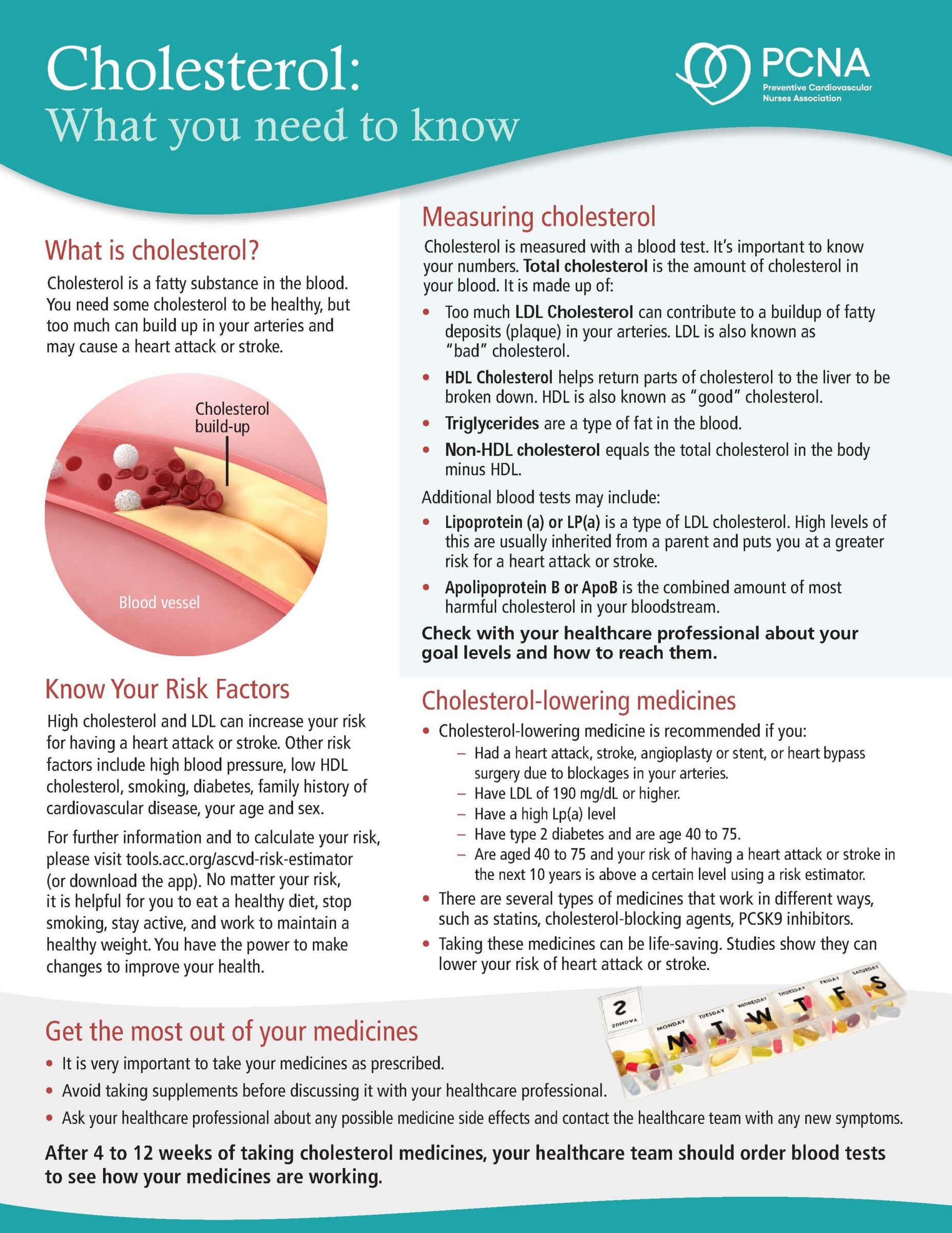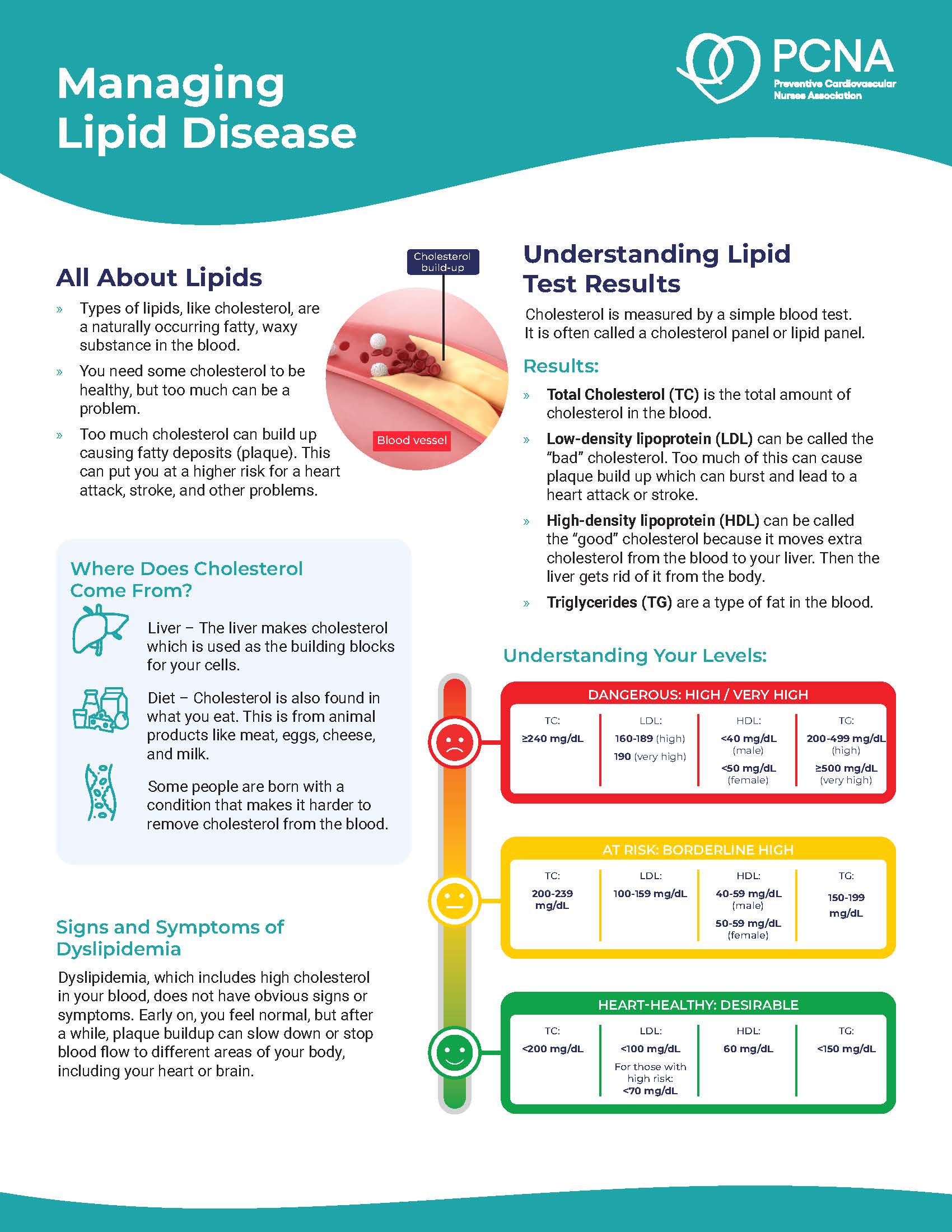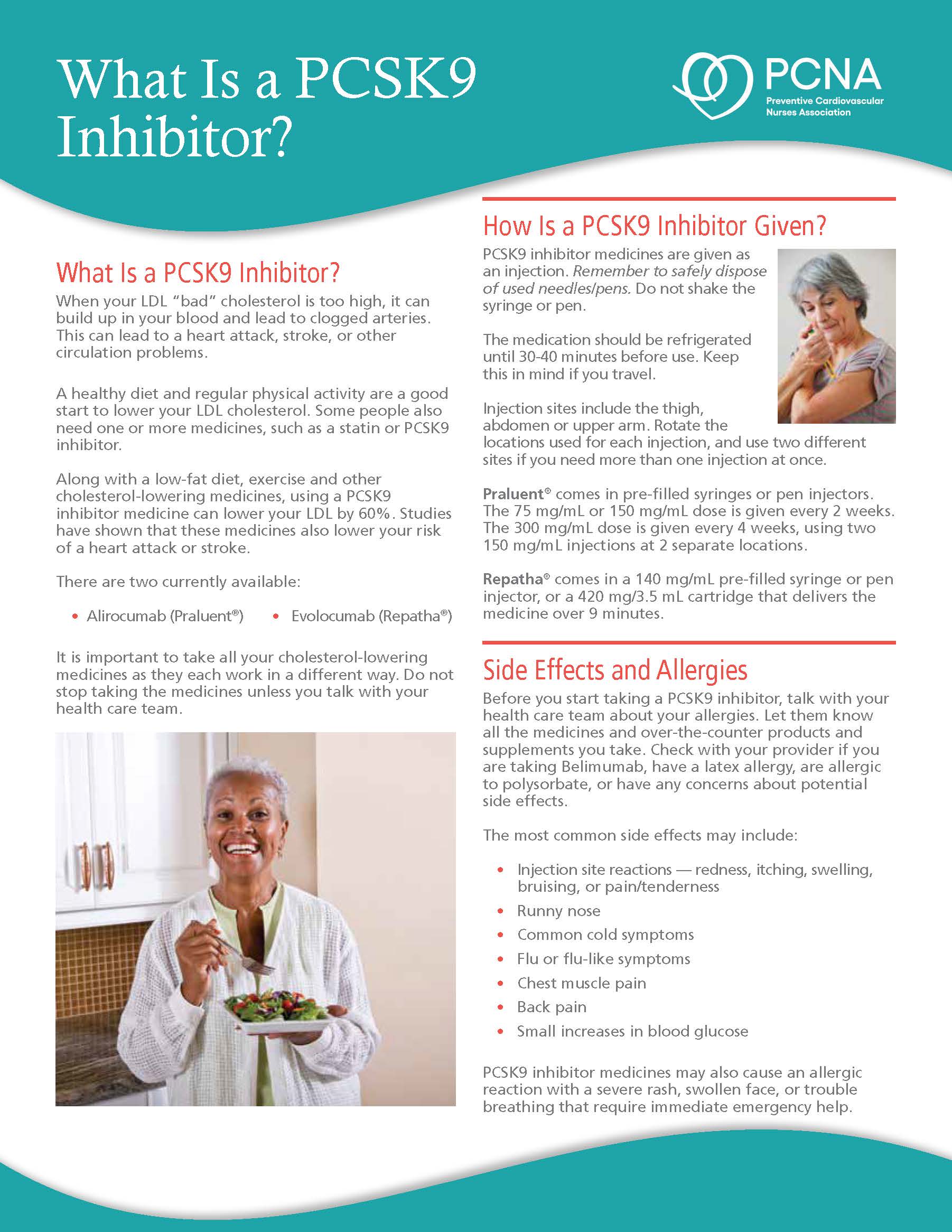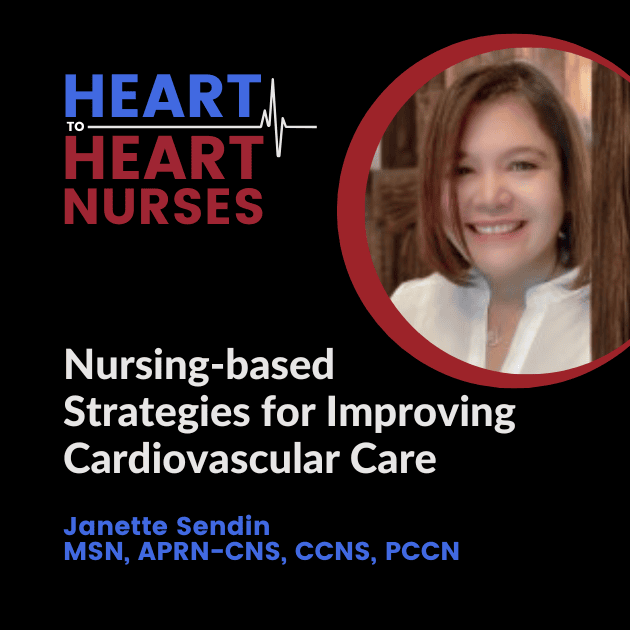How can health care organizations promote cardiovascular nursing leadership and practice to improve patient care and outcomes? Learn from Janette Sendin, MSN, APRN-CNS, CCNS, PCCN, of Orlando Health Orlando Regional Medical Center (recipient of the PCNA Institutional Award) about the Center’s education, training, and other opportunities that can be implemented in other locations of various sizes.
Mary Janette Sendin/Orlando Health podcast episode transcript
[00:00:00] I’m Erin Ferranti, board president for PCNA, and I’d like to welcome you to this episode of the Heart to Heart Nurses Podcast. PCNA is the proud home of cardiovascular nurses and one of the leading figures in the fight against cardiovascular disease. We have the resources you need for your day-to-day practice or to follow your passion to new areas of learning and growth.
Geralyn Warfield (host):
Welcome to today’s episode where we have the pleasure of speaking with Jeanette Sendin, who’s representing Orlando Health, which is the recipient of PCNA’s Institutional Award at the 2025 PCNA Cardiovascular Nursing Symposium. Jeanette, could you introduce yourself to our audience, please?
Janette Sendin (guest)
I am Jeanette Sendin. I’m an advanced practice registered nurse at Orlando Health, working at Orlando Regional Medical Center here in central Florida. And I work with cardiology, and I also work with a quality team.
Geralyn Warfield (host):
So, what makes Orlando Health so special when it comes to cardiovascular care?
Janette Sendin (guest)
Well, at Orlando Health, we have a very robust cardiovascular program, and we take pride in the programs we have in place, and the practices that we have that contributes to the success of the care we provide our patients.
We focus on data-driven quality improvements where we benchmark with national registries. And with this, we’re able to identify the gaps in our processes and care and use evidence-based practices to provide the optimal care for our patients. We don’t only collect data, but we ensure that we put actionable items to the data that we collect.
Geralyn Warfield (host):
I suspect that this takes a big team effort in order to accomplish what you have thus far.
Janette Sendin (guest)
Correct. We have a very strong integration between physicians, cardiologists, our community partners, cardiothoracic surgeons, peripheral vascular surgeons, advanced practice providers, nurses, pharmacies, we have palliative care, and many multidisciplinary disciplines.
I believe that our collaboration is integral in the successes that we have in cardiovascular space.
Geralyn Warfield (host):
So, these connections that you have really work for you. And it’s obvious in the care that you provide for patients that this is really a success for you. How might you recommend to another organization who doesn’t necessarily have these connections already built in, what kinds of things could you recommend to them that they might be able to implement either on a small or a larger scale that’s worked for you?
Janette Sendin (guest)
I believe knowing what is current is the best way to identify what are the gaps in the processes or in the care that we provide our patients. And being up to date with the latest guidelines, and also knowing the latest evidence is very important.
We are very fortunate that we have strong leaders and leaders who empower, engage, and support every member of the team at Orlando Health. We are given the opportunity to provide our voices, to exercise our strengths and partner together with the goal and mission to ensure that the care that we provide our patients, and the community we serve, is optimal.
Geralyn Warfield (host):
So, I know that our audience has a lot of nurses and cardiovascular nurses specifically in it. Do you offer any specialized training, any programs, any resources for the nurses that are in your facility?
Janette Sendin (guest)
We do. We are very strong in health fairs. This is one way to guide our nurses on the pathways that they use, or that they feel that they would like to follow as they take their journey in their career.
We have our GN program. You know, we call it the GN Residency Program.
Orlando Health also supports attending national conferences like this [the Cardiovascular Nursing Symposium].
Orlando Health also offers reimbursements to team members who would like to pursue further education.
And at Orlando Health, the quality of nursing care is very important. We have our quality department, which I am humbled to be part of. And we ensure that nurses and all members of the team work together to ensure that we prevent any hospital-acquired infection.
We also ensure that the nurses understand and are given the necessary tools and education to ensure that they execute their care of their patients at the highest level.
Geralyn Warfield (host):
So, in any organization, there are nurses that have various experience levels. So, do you offer different types of opportunities for nurses at different parts of their career?
Janette Sendin (guest):
To begin with, we partner with universities within Florida, and we allow students to conduct their internship or practicum at our hospital. By doing that, they get familiar, or they get introduced to, what the hospital setup is: philosophy, the mission, the culture.
And as a part of that, once they come on board and they decide to join the organization, as I mentioned earlier, we have what we call a GN residency program. In this program, they identify —or the new nurses on board can identify—which specialty do they feel that they would be more interested in, or they would better fit in, or they would feel that this is where they’re going to grow, you know, as a new nurse.
Geralyn Warfield (host):
We’re going to take a quick break, and we will be right back.
Geralyn Warfield (host): We’re back with Jeanette Sendin talking a little bit about Orlando Health and the strategies they use to improve patient health, as well as collaborate and have a wonderful team environment.
So, it sounds like from across the spectrum of nursing and across the organization overall, there are some key things that any organization could continue to improve upon to have some of the same successes that you are.
Some of those things sound like to me to be things like an organization that supports every individual regardless of their role in the organization or their tenure in the organization.
The second is wide communication about quality and the importance of that.
The third thing would be products and services both for patients and for the professionals and staff that work at your organization to help them understand the importance of high-quality health and making sure that they have the tools that they need to implement those.
Is there anything that I’ve missed in my list that you would point to towards something that somebody from another organization could take away as best practices from what you all do?
Janette Sendin (guest)
I would say that as far as nursing is concerned, or preparing them, is that we have what we call a mentorship program. In that way, when the transition from a new nurse to the organization or a graduate nurse, you know, they’re partnered with a seasoned nurse or an experienced nurse throughout their transition, you know, as they grow in the organization. That’s one.
We also empower them or provide them with tools like learning, making learning easy at the bedside.
We also conduct mock codes, simulation training.
We also have grand rounds, which basically involves physicians, nurses, and the multidisciplinary members of the team.
We have icons or QR codes at the desktop, at the bedside. Like for instance, for code debriefing, you know, they can use that, they can provide their feedback and discuss how they could have done things differently or done things better.
One thing that we also conduct is we do mortality reviews, which goes back to the quality improvements that we do. And with mortality reviews, we identify if there are any opportunities or gaps in the care that were provided to the patient, and how we could have done it differently.
So, that being that said, Orlando Health, the care of our patients takes precedence. The quality of care that we provide our patients is important.
We value not only the patient, but their families. And the strong partnership, the integration of multidisciplinary collaboration, I believe brings forth the successes that we have as an organization in the management and prevention of cardiovascular diseases.
At Orlando Health, we also highlight stories that nurses have performed and identified that promoted safety to patients. We call it the Great Catch Award. And this is highlighted during our quality triad.
Geralyn Warfield (host):
Is there anything else that you would like us to know about strategies that you use at your facility that others might learn from?
Janette Sendin (guest)
We also have what we call a visual management tool. It’s (what) we call it the GIMBA board. And the GIMBA means at this moment. We talk about quality metrics. We talk about improvements. We talk about opportunities. And we also talk about celebrations.
By doing this, we involve nurses and encourage them to be aware and proactive with our strategic imperatives to ensure that we all stay on track and we maintain the mission and the vision of Orlando Health in making sure that the care provided to our patients is at the optimum level.
Geralyn Warfield (host):
Thank you so much for being with us today. Jeanette. You have done a great job of sharing strategies that other institutions could use to improve their quality, to improve their personnel’s knowledge, as well as skills and comfort with content areas, and making sure that the patient is always centric. We really appreciate you being here today
Janette Sendin (guest)
Thank you, it was a privilege.
Geralyn Warfield (host):
This is your host, Geralyn Warfield, and we will see you next time.
Thank you for listening to Heart to Heart Nurses. Visit PCNA.net for clinical resources, continuing education, and much more.
Topics
- Atherosclerotic Cardiovascular Disease (ASCVD)
- Professional Development
Published on
July 1, 2025
Listen on:

MSN, APRN-CNS, CCNS, PCCN, FPCNA
Related Resources



- « Previous
- 1
- 2
- 3
- 4






